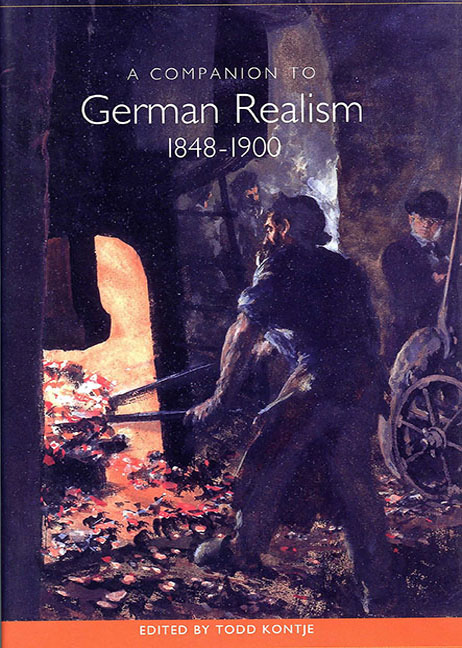Book contents
- Frontmatter
- Contents
- Preface
- Introduction: Reawakening German Realism
- Adalbert Stifter's Brigitta, or the Lesson of Realism
- Mühlbach, Ranke, and the Truth of Historical Fiction
- “In the Heart of the Heart of the Country”: Regional Histories as National History in Gustav Freytag's Die Ahnen (1872–80)
- A Woman's Post: Gender and Nation in Historical Fiction by Louise von François
- Friedrich Spielhagen: The Demon of Theory and the Decline of Reputation
- Wilhelm Raabe and the German Colonial Experience
- From National Task to Individual Pursuit: The Poetics of Work in Freytag, Stifter, and Raabe
- Das Republikanische, das Demokratische, das Pantheistische: Jewish Identity in Berthold Auerbach's Novels
- E. Marlitt: Narratives of Virtuous Desire
- The Appeal of Karl May in the Wilhelmine Empire: Emigration, Modernization, and the Need for Heroes
- Making Way for the Third Sex: Liberal and Antiliberal Impulses in Mann's Portrayal of Male-Male Desire in His Early Short Fiction
- Effi Briest and the End of Realism
- Works Cited
- Notes on the Contributors
- Index
Das Republikanische, das Demokratische, das Pantheistische: Jewish Identity in Berthold Auerbach's Novels
Published online by Cambridge University Press: 27 April 2017
- Frontmatter
- Contents
- Preface
- Introduction: Reawakening German Realism
- Adalbert Stifter's Brigitta, or the Lesson of Realism
- Mühlbach, Ranke, and the Truth of Historical Fiction
- “In the Heart of the Heart of the Country”: Regional Histories as National History in Gustav Freytag's Die Ahnen (1872–80)
- A Woman's Post: Gender and Nation in Historical Fiction by Louise von François
- Friedrich Spielhagen: The Demon of Theory and the Decline of Reputation
- Wilhelm Raabe and the German Colonial Experience
- From National Task to Individual Pursuit: The Poetics of Work in Freytag, Stifter, and Raabe
- Das Republikanische, das Demokratische, das Pantheistische: Jewish Identity in Berthold Auerbach's Novels
- E. Marlitt: Narratives of Virtuous Desire
- The Appeal of Karl May in the Wilhelmine Empire: Emigration, Modernization, and the Need for Heroes
- Making Way for the Third Sex: Liberal and Antiliberal Impulses in Mann's Portrayal of Male-Male Desire in His Early Short Fiction
- Effi Briest and the End of Realism
- Works Cited
- Notes on the Contributors
- Index
Summary
Berthold Auerbach (1812–1882) was one of the most popular and critically acclaimed German authors of the nineteenth century. His oeuvre included novels, literary and cultural criticism, dramas, and stories, but his success rested mainly on his Dorfgeschichten, village tales set in his native region of the Black Forest. These tales were celebrated for their social authenticity and for their heightened realism that allegedly captured the German spirit. Prior to the publication of these tales Auerbach, a German Jew, had written two novels about Jewish life: Spinoza: Ein historischer Roman (Spinoza: An Historical Novel, 1837), revised as Spinoza: Ein Denkerleben (Spinoza: A Thinker's Life, 1854), and Dichter und Kaufmann: Ein Lebensgemälde (Poet and Merchant: A Picture of Life, 1840), revised as Dichter und Kaufmann: Ein Lebensgemälde aus der Zeit Moses Mendelssohns (Poet and Merchant: A Picture of Life from the Time of Moses Mendelssohn, 1855). The novels’ anticipated audience comprised both Jews and non-Jews, and the works were intended to have an integrative function by showing Jewish life at times of transition and making a plea for tolerance based on understanding and the ideal of humanity [Humanität]. Auerbach was disappointed by the novels’ reception and turned to the genre of the village tales. He never again completed a novel with a Jewish community as its chief subject matter. This is not to say that his turn to a new genre meant that he had turned away from his own Jewish identity. As this study will show, in his post-1848 novels Auerbach places “the Jewish question” — particularly as it is linked with the issues of religious confession, political systems, and social hierarchies — into a contemporary setting and weaves it into the concerns of German realism.
Berthold Auerbach (né Moyses Baruch Auerbacher) was born in Nordstetten, a small town in Württemberg. He remembered relations between the Jewish and Catholic communities of the town, which had a forty percent to sixty percent Jewish-Catholic ratio, as largely peaceful, although interspersed with a few hostile incidents. Auerbach's early education was firmly grounded in Judaism. After attending the first German Jewish elementary school in the state of Württemberg, he went on to a school devoted to the study of the Talmud but was unhappy about the narrow focus of the curriculum there.
- Type
- Chapter
- Information
- A Companion to German Realism 1848-1900 , pp. 223 - 258Publisher: Boydell & BrewerPrint publication year: 2002



